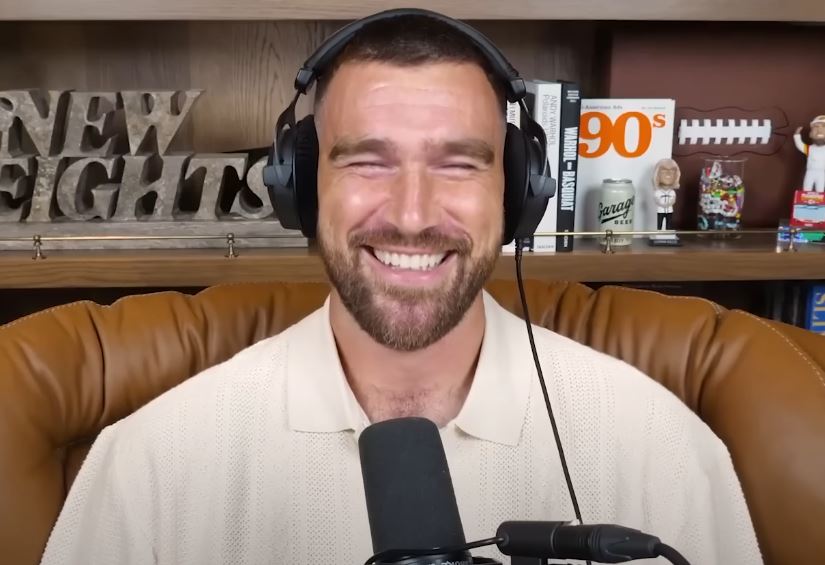
Karoline Leavitt and Travis Kelce’s recent lawsuit has developed into an incredibly intricate tale that crosses media, politics, and sports. The Kansas City Chiefs star was visibly uncomfortable with the White House Press Secretary’s comments, and what was supposed to be a lighthearted interview swiftly turned into a controversy. In a matter of days, Kelce’s legal team filed a $50 million lawsuit, demonstrating his refusal to let the incident go unpunished.
The incident happened during what was supposed to be a post-game interview about Kelce’s youth initiatives and charitable foundation. Rather, the friendly broadcast turned into a televised confrontation when Leavitt accused him of hypocrisy and questioned his “influence as a public figure.” Insiders from the production team reportedly described the exchange as “completely unscripted and unsettling,” while viewers described it as “shockingly personal.”
| Attribute | Information |
|---|---|
| Full Name | Travis Michael Kelce |
| Born | October 5, 1989 |
| Birthplace | Westlake, Ohio, USA |
| Profession | NFL Player (Tight End, Kansas City Chiefs) |
| Known For | Record-breaking career, philanthropy, media appearances |
| Estimated Net Worth | Approximately $45 million (as of 2025) |
| Legal Issue | $50 million lawsuit filed against Karoline Leavitt and television network |
| Notable Traits | Charismatic presence, leadership, composure under pressure |
The confrontation was handled with remarkable restraint by Kelce, who is renowned for his extraordinary poise both on and off the field. He gave succinct, respectful answers while maintaining his composure and professionalism instead of getting into a furious argument. His composed manner during that heated exchange went viral, garnering millions of views and igniting a heated discussion about civility in contemporary broadcasting. It is now one of the most viewed videos on the internet.
By bringing the lawsuit, Kelce has brought attention to a discussion about media accountability and ethics that is becoming more and more significant. According to his lawyers, the network did not shield him from a “premeditated verbal ambush” intended to elicit a response in order to boost ratings. Citing missed sponsorship opportunities and reputational harm, they assert that the incident resulted in severe emotional distress and financial harm.
According to Karoline Leavitt, the incident is just one more chapter in an increasingly prevalent trend of public controversy. She has established a reputation for being straightforward, assertive, and frequently polarizing as one of the youngest and most vocal White House press secretaries in recent history. She was made fun of in recent weeks for using social media to fact-check a Fox News report, which many characterized as being unduly combative. That criticism has now been heightened by the altercation with Kelce, prompting concerns about whether her combative communication style is going too far in her career.
The entire exchange, according to those close to the production, took place in a matter of seconds. The purpose of the segment was to draw attention to Kelce’s “87 & Running Foundation,” which provides education and mentoring to underprivileged youth. However, Leavitt’s comments deviated into personal charges that left the NFL player visibly stunned rather than talking about his charitable accomplishments. The damage had already been done when the producers abruptly cut to a commercial break.
The public’s response has been divided and intense. Supporters of Kelce contend that he is fully entitled to protect his reputation, particularly in cases where an interview transcends journalism and turns into a public spectacle. Although most people agree that what transpired that day straddled the line between provocation and inquiry, some argue that the lawsuit might deter journalists from posing difficult questions.
The $50 million claim encompasses both principle and damages. In his lawsuit, Kelce charges the network with negligence and duty breach, claiming that their oversight failed to prevent a “hostile environment” from developing live on TV. According to legal experts, the case might establish a standard for how well-known people are handled during spontaneous media appearances, especially in a time when viral events have the power to instantly define a career.
According to reports, Leavitt’s team has dismissed the incident as a “misunderstanding,” implying that her remarks were misconstrued. Social media video clips, however, paint a different picture, showing an obviously uncomfortable athlete attempting to diffuse the situation while a political spokesperson keeps bringing up personal matters that have nothing to do with the interview.
Kelce’s response was seen by many as a professional masterclass. Instead of storming off or retaliating, he remained calm and later said in private that respect should always be at the center of public conversation. That strategy is consistent with his image as a reflective athlete who, rather than getting involved in controversy, frequently uses his platform to motivate the next generation.
Discussions concerning the precarious relationship between public figures and the media were also rekindled by the incident. Athletes have been speaking out more and more in recent years about the way interviews are framed or altered to make dramatic headlines. A particularly notable illustration of how poorly managed live television can turn into a legal and cultural hot spot is Kelce’s case.
Observers have pointed out that this dispute goes well beyond athletics. It is a reflection of a larger cultural weariness with character attacks and public confrontation masquerading as journalism. By filing a lawsuit, Kelce is essentially contesting that system and calling for responsibility for actions that far too frequently go unpunished under the pretext of free speech.
It’s interesting that the lawsuit was filed at a time when media outlets are once again emphasizing civility. Social media has made it harder to distinguish between commentary and reporting, frequently favoring sensationalism over content. In fact, Kelce’s lawsuit might spur reform by pushing networks to enact more explicit moral standards for live interactions.
The personal impact on both individuals is evident despite the headlines. Currently juggling his relationship with Taylor Swift and his athletic career, Kelce has had to deal with an increase in public scrutiny. As Leavitt’s communications style becomes a point of contention for both her supporters and detractors, she is under growing political pressure.
It is still evident that the reason this case has captured public interest is because it unites two of the most potent spheres in America: politics and sports. Through their respective contributions to politics and athletic prowess, these individuals embody spheres of influence that reach millions of people. Their live TV altercation turned into a metaphorical conflict between sincerity and spectacle, authenticity and performance.
The way television networks prepare for live interviews may change if the lawsuit is successful. Future visitors, especially well-known athletes and celebrities, might start requesting contractual protections to avoid such ambushes, according to legal experts. In that regard, Kelce’s choice might prove especially novel and establish a new benchmark for media responsibility.
